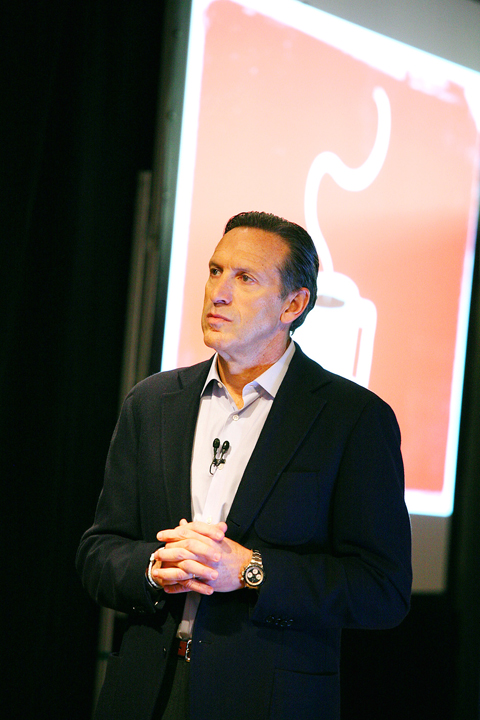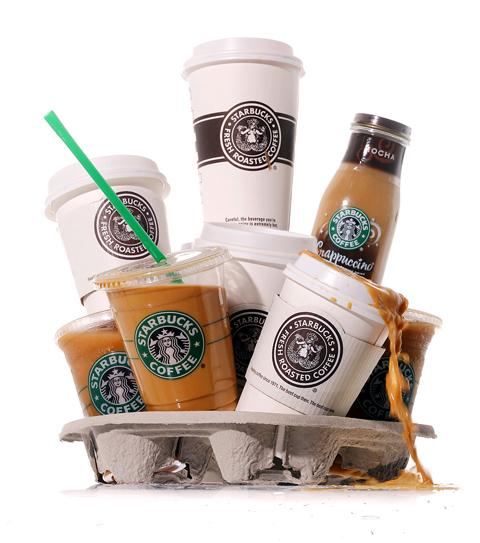The Frappuccino king truly knows how to talk. Starbucks chairman Howard Schultz is dear friends with Rwanda’s president, has a close relationship with the prime minister of Ethiopia and had a grandfather from Manchester, England.
Perched on a leather sofa in a Seattle conference hall, Schultz’s conversation hops around the world as he discusses ethical sourcing, quality roasting and the “unparalleled” standards of freshness in Starbucks’ coffee beans.
The tall, wiry, 55-year-old Brooklyn-born tycoon is on a charm offensive. His chain of 16,680 stores is going through the toughest patch of its 38-year history as caffeine-seekers feel the pinch from straitened economic conditions. Schultz, who built the global empire from just a handful of branches in Washington state, feels misunderstood.

PHOTO: NY TIMES NEWS SERVICE
He complains that Starbucks, which has seen its share price plunge by two-thirds in two years, has unfairly been labeled a “poster child for excess” by critics, who see its creamy Frappuccinos and white chocolate mochas as a symbol of boom-time folly.
“There’s this myth that has been exacerbated by others that Starbucks means a US$4 cup of coffee, which is not true,” he says, ticking off a list of Starbucks’ cheaper, down-menu drinks.
“We have been relatively silent about how we’ve been positioned. It’s not going to remain like that,” he says. “We will be more aggressive.”

PHOTO: NY TIMES NEWS SERVICE
Starbucks’ profits dived by 53 percent to US$315 million in the year to September. For the first quarter of its fiscal year, earnings fell even further, slumping 69 percent. In the last year, the firm has announced more than 10,000 job cuts and nearly 1,000 store closures, including two-thirds of its chain in Australia.
Schultz, who returned as chief executive last year after taking a back seat as chairman, is trying to revive the “theater” of Starbucks branches. New coffee machines are lower, giving customers a better view of baristas making their drinks. Smelly sandwiches are out, to restore the aroma of coffee beans, and refurbishments are planned to give stores a locally themed and less uniform look with recycled materials, vintage coffee crates and funky lighting.
Reluctantly and slightly defensively, Schultz admits that Starbucks expanded too fast in the good times.
“We have had a cataclysmic financial crisis, the likes of which no one has seen before,” he says. “If we had a crystal ball about where the economy was going, I’m sure we wouldn’t have made certain decisions.”
Early last year, Starbucks had a long-term ambition of expanding to 30,000 stores globally. That appears to have gone by the wayside.
“I don’t think it would be responsible to look at the total number of stores as a specific goal,” he says.
Starbucks will launch a brand of instant coffee, Via, at its 747 stores in Britain and Ireland next week, in Seattle and Chicago this month before rolling it out to all of its US stores in the fall. The granules will be in sachets for use at home and, Schultz says, are the product of a patented, high-tech method of retaining flavor, which differs from that used by Maxwell House, Kenco or Nescafe.
“The worldwide [instant coffee] category is US$17 billion and most of the coffee, candidly, isn’t very good,” says Schultz, who told shareholders at Starbucks’ annual meeting last week that dinner party guests and even his own wife couldn’t tell the difference when he served them Via.
Brought up on a down-at-heel New York housing estate, Schultz cut his teeth in the business world as a Xerox salesman before joining a Swedish kitchenware company, Hammarplast. One of Hammarplast’s clients for upmarket coffee-makers was a tiny Seattle firm, Starbucks, which had a handful of outlets selling coffee beans and teas. Schultz was impressed by its coffee and joined the company in 1982, before buying it in 1987. He cites a 1983 visit to an espresso bar in Milan as his inspiration for taking the “theater” of genuine coffee-making to the masses.
Schultz comes from humble beginnings — his father, Fred, drifted through jobs as a taxi driver, factory worker and truck driver.
“He was an uneducated man, a war veteran, and unfortunately he never quite got his piece of the American dream. I’ve always wanted to try to build the kind of company my father never got a chance to work for,” Schultz says, citing healthcare benefits and share options for Starbucks’ part-time workers — although he has faced criticism for discouraging US unions on the grounds that they are “unnecessary.”
Starbucks’ effort to revive its fortunes will play heavily on what Schultz sees as its ethical strengths. All of the espresso-based coffee used in its European stores is Fairtrade certified. The company’s charitable efforts extended to mobilizing thousands of employees to help rebuild hurricane-savaged New Orleans last year. Trying to tap into the zeitgeist, the firm offered a free coffee to anybody who voted on US election day.
“Even though people are under economic pressure, they still want to support those brands with values that are compatible with their own,” says Schultz, who professes to be perplexed that Starbucks is targeted by a “vocal minority” of anti-capitalist protesters.
A four to five-cups-a-day man, Schultz still seems to retain his passion for coffee which, at one point, made him a billionaire — although his wealth has dropped back into millionaire territory since Starbucks’ fortunes dipped.
Starbucks, says Schultz, has a barometer of the economic mood in its minute-by-minute coffee sales.
“Every day we can see levels of consumer confidence around the world because we’ve got stores in 50 countries,” he says.
Not averse to enjoying life, Schultz faced flak for using Starbucks’ brand-new US$45 million corporate jet in January for a holiday in Hawaii, where he rubbed shoulders with the cyclist Lance Armstrong. Schultz footed the bill and the jet has since been put up for sale.
“I never wanted to be on any billionaires list,” he says. “I never define myself by net worth. I always try to define myself by my values.”
Warming up for another discussion of coffee-buying ethics in developing countries, he continues: “My mother taught me something at a young age — she said ‘you are the company you keep.’ To define yourself by some label or some level of resources — that’s pretty shallow.”

MORE VISITORS: The Tourism Administration said that it is seeing positive prospects in its efforts to expand the tourism market in North America and Europe Taiwan has been ranked as the cheapest place in the world to travel to this year, based on a list recommended by NerdWallet. The San Francisco-based personal finance company said that Taiwan topped the list of 16 nations it chose for budget travelers because US tourists do not need visas and travelers can easily have a good meal for less than US$10. A bus ride in Taipei costs just under US$0.50, while subway rides start at US$0.60, the firm said, adding that public transportation in Taiwan is easy to navigate. The firm also called Taiwan a “food lover’s paradise,” citing inexpensive breakfast stalls

TRADE: A mandatory declaration of origin for manufactured goods bound for the US is to take effect on May 7 to block China from exploiting Taiwan’s trade channels All products manufactured in Taiwan and exported to the US must include a signed declaration of origin starting on May 7, the Bureau of Foreign Trade announced yesterday. US President Donald Trump on April 2 imposed a 32 percent tariff on imports from Taiwan, but one week later announced a 90-day pause on its implementation. However, a universal 10 percent tariff was immediately applied to most imports from around the world. On April 12, the Trump administration further exempted computers, smartphones and semiconductors from the new tariffs. In response, President William Lai’s (賴清德) administration has introduced a series of countermeasures to support affected

CROSS-STRAIT: The vast majority of Taiwanese support maintaining the ‘status quo,’ while concern is rising about Beijing’s influence operations More than eight out of 10 Taiwanese reject Beijing’s “one country, two systems” framework for cross-strait relations, according to a survey released by the Mainland Affairs Council (MAC) on Thursday. The MAC’s latest quarterly survey found that 84.4 percent of respondents opposed Beijing’s “one country, two systems” formula for handling cross-strait relations — a figure consistent with past polling. Over the past three years, opposition to the framework has remained high, ranging from a low of 83.6 percent in April 2023 to a peak of 89.6 percent in April last year. In the most recent poll, 82.5 percent also rejected China’s

PLUGGING HOLES: The amendments would bring the legislation in line with systems found in other countries such as Japan and the US, Legislator Chen Kuan-ting said Democratic Progressive Party (DPP) Legislator Chen Kuan-ting (陳冠廷) has proposed amending national security legislation amid a spate of espionage cases. Potential gaps in security vetting procedures for personnel with access to sensitive information prompted him to propose the amendments, which would introduce changes to Article 14 of the Classified National Security Information Protection Act (國家機密保護法), Chen said yesterday. The proposal, which aims to enhance interagency vetting procedures and reduce the risk of classified information leaks, would establish a comprehensive security clearance system in Taiwan, he said. The amendment would require character and loyalty checks for civil servants and intelligence personnel prior to